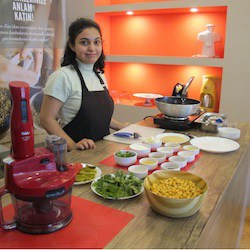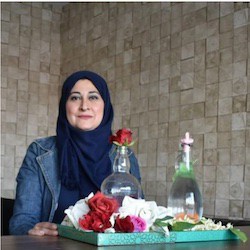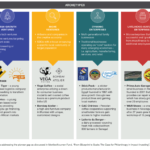An Engaging Approach to Entrepreneurship Training: Four Free Case Studies Highlight Solutions to Business Dilemmas in Emerging Markets
Limited bandwidth, heavy competition and high-stakes decision-making with incomplete information — these are all issues entrepreneurs face when they reach the “growth and establishment” stage of the business lifecycle. Yet there’s a lack of affordable and accessible training tools geared toward helping entrepreneurs in emerging markets overcome these challenges.
As designers of entrepreneurship curricula, we at the William Davidson Institute (WDI)’s Entrepreneurship Development Center have experienced the challenge of not having enough case studies relevant to entrepreneurs in emerging markets to incorporate into our programs. To help fill this gap, we identified four participants in an entrepreneurship training program we helped develop who were facing various business dilemmas. We then built case studies appropriate for entrepreneur training programs in emerging markets based upon their experiences. This new case collection, “Cooking Up Success in Turkey: Entrepreneurs on the Path to Growth,” has just been released by WDI Publishing. These training tools are freely available and can be incorporated into entrepreneurship training programs run by accelerators, incubators, professional training providers and universities. Entrepreneurs may also be interested in reading the cases on their own.
The collection consists of four cases, each about an entrepreneur with a business operating in the Turkish food and agriculture sector who encounters a business dilemma on the path to growing their enterprise. The cases were written within the context of the Syrian refugee crisis, which had a significant impact on Turkey as the host of approximately 3.6 million refugees (about 60% of all Syrian refugees). Three of the featured entrepreneurs are refugees themselves, who escaped the civil war in Syria and resettled in Turkey.
These cases profile entrepreneurs who participated in the Livelihoods Innovation through Food Entrepreneurship (LIFE) Project. The three-year program established two food enterprise centers in Istanbul and Mersin, where 324 entrepreneurs from 10 countries — including both refugees and local community members — had access to shared kitchen space for testing and producing their products. This ambitious project was led by the Center for International Private Enterprise and funded by the U.S. Government. WDI’s role involved developing the entrepreneurship incubation curriculum, customizing it for the local context and providing training for instructors. Learn more about it here.
Let’s take a closer look at the business dilemmas encountered by these entrepreneurs.
A Social Entrepreneur Explores Alternative Business Models During the COVID-19 Pandemic
Of the four featured, Rawan Hudaifa’s business, Tina Zita, was the hardest hit by the COVID-19 pandemic. Hudaifa is a Syrian migrant and social entrepreneur. Tina Zita is a catering business that offers Levantine dishes prepared by female migrant chefs. The business has a mission to empower women migrants economically by hiring them as chefs and offering them fair wages.
In April 2020, Hudaifa found her social enterprise in dire circumstances amid the pandemic. Due to public health risks, a ban on gatherings, decreased job security, and concerns around food and hygiene safety, Hudaifa’s catering business quickly became threatened as the demand for catered events in Turkey plunged. The case focuses on the decision Hudaifa needed to make about how to pivot her business model to align with the new, uncertain reality of the pandemic. By reading this case, entrepreneurs will deepen their understanding of how to pivot the strategy of a business, while learning how to apply the concept of social entrepreneurship to a business model.
A Rose Water Business Weighs Expansion Options
Zeina Wazzan escaped the war in Syria and found herself in Turkey, unable to continue her career as an art teacher. She recalled making rose water many years back in Syria and realized she might find a market for it in Turkey. Since 2018, Wazzan has been selling rose water and other essences on a small scale in Turkey. Her business recently arrived at an inflection point when she bought a machine that would allow her to increase production tenfold.
Wazzan wanted to expand the business and was weighing several distribution options. Should she sell more through her current retail channel? Should she try to expand her nascent wholesale business, in which she sells the rose water in bulk to be resold in perfumes? Or should she make a bold leap and open her own retail shop, selling not only her own products, but also products made by her fellow Syrian women refugees? Each of these distribution options comes with advantages and disadvantages. For example, by focusing on wholesale distribution, she would be able to sell at higher volume and have fewer orders to process — but she would not be building her own brand. Entrepreneurs who use this case study will no doubt become just as absorbed as we, the case writers, did in identifying the pros and cons and outlining a sound course of action.
A Cheese Producer Pursues a New Market through E-Commerce
Mohamed Bakkar, an entrepreneur running a business called Besma (“joyful” in Arabic), fled to Turkey in 2016. Bakkar had been an electrical engineer in Syria, but he was unable to find a job in his field upon arrival in Turkey due to the Arabic-Turkish language barrier. He decided to pursue a cheese business instead, making the cheese the same way his mother did when he was a child. He produced the cheese in bulk and prepared it for distribution to local Syrian-owned dairy stores.
After about five years, Bakkar had built a customer base of 10 Syrian-owned stores in Istanbul, but the Syrian-style cheese market had become increasingly crowded. He needed a strategic plan for growth, and was considering selling directly to individual customers and creating an e-commerce website to expand his reach to include Turks. In working with this case study, entrepreneurs will build an understanding of the role of e-commerce and social media marketing in expanding a business’ customer base and reaching a new target market.
An Artisanal Bread Baker Diversifies her Product Line
Devrim Mumcuogullari, the one Turkish entrepreneur featured in this collection, was a busy tech executive in Istanbul when she developed serious food allergies and needed to change her diet. She started baking bread with heritage grains for her own consumption, then decided to go to market with her healthy and unique offering.
In looking to grow her business, which she called Mutfakta Devrim (“revolution in the kitchen” in Turkish), she wondered if she should double down on bread or launch other homemade foods she had been incorporating into her diet to maintain her health. This case prompts discussion around how an entrepreneur can think strategically about how to expand their product line.
Case Studies Promote Learning and Provide Inspiration
Case studies have the power to engage, influence and inspire — and bring concepts to life. While the cases are brief, we provided enough background information to enable entrepreneurs to put themselves in the shoes of the protagonists and to feel inspired to take on their issues as if they were their own. According to Osman Cakiroglu, an Istanbul-based entrepreneurship expert and collaborator on the entrepreneur training program we helped develop, the case on Mumcuogullari “reads like a thriller rather than a dull academic case.” Receiving that feedback, we felt we had achieved our goal: creating cases that can enliven the exploration of entrepreneurship.
To assist instructors in facilitating dynamic case discussions, we provide ample information about the social context in which these entrepreneurs operate. We also identify entrepreneurship tools and concepts that would be appropriate for each of the protagonists to adopt, which instructors can elaborate on to enable entrepreneurs to grow their repertoire of entrepreneurial skills and apply them to their own businesses. We expect that these cases will spark many lively and memorable discussions in entrepreneurship classrooms and workshops around the world, while also finding their way into the hands of entrepreneurs working to navigate the challenges of doing business in emerging markets.
Amy Gillett is Vice President of Education, and Kristin Babbie Kelterborn is a Senior Project Manager with a dual role on the Grants Management and Entrepreneurship Development teams at the William Davidson Institute, NextBillion’s parent organization.
Photos courtesy of the LIFE Project.
- Categories
- Education




